Feeding Tulips: Best Fertilizers & Plant Food for Blooms
Tulips do not need too much fertilizers. It is a good idea to use a bulb fertilizer at the time of planting tulip bulbs. Later, use a balanced fertilizer when you see new growth emerging.
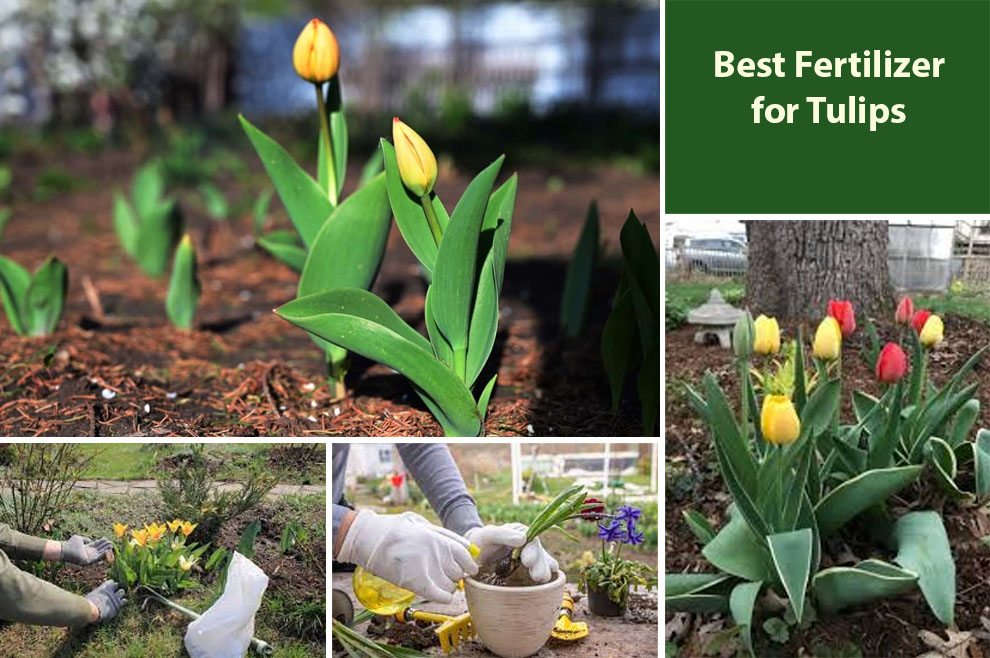
While Tulips are not heavy feeders, you must provide them with suitable nourishment to ensure optimal growth and blossoming.
If planting the bulbs in the fall season, you must top-dress the bed with a bulb fertilizer for tulips. You can consider plant food with a balanced formulation like 10-10-10 or a slow-release feed with a 10-15-10 NPK ratio.
It also helps to add natural fertilizers like bone, blood, and fish meal to tulip plants. Tulips thrive in soil with an alkaline to neutral pH. If the soil is acidic or has a pH lower than 6, consider adding lime to elevate the pH levels.
You can enjoy a splendid display of beautiful tulip flowers in your garden by providing suitable soil conditions and good feed.
- Best for Vibrant Flowers – Espoma Natural and Organic Bulb-Tone Plant Food
- Ideal for Quick Results – Jobe’s Organics Granular Fertilizer
- Best Natural Plant Food – Burpee Bone Meal Fertilizer
Feeding Tulips: Meeting The Essential Nutrient Requirements
When it comes to tulip food, a balanced approach is imperative. You can pick a slow-release plant food with a 10-10-10 or 10-15-10 formulation, rich in nitrogen, phosphorous, and potassium to meet your plant’s nutrient requirements.
Beyond the NPK trio, tulips also benefit from other vital elements. These comprise micronutrients like iron, manganese, copper, and zinc, crucial for the plant’s overall health and vibrant coloration.
You also need to work out a daily care routine for your tulip plants to make them bloom in time.
Best Fertilizers For Tulips That Make Them Vibrant and Strong
There is a bunch of excellent bulb fertilizers that you can use to nourish tulips and ensure their optimal blooming and growth. Below we will cover a few of the top alternatives.
1. Espoma Natural and Organic Bulb-Tone Plant Food
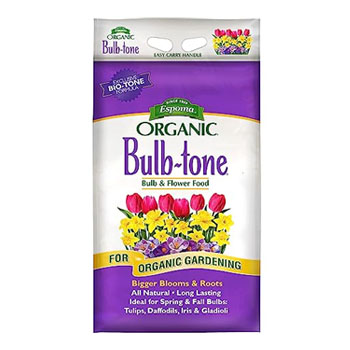 |
Check price on Amazon |
NPK: 3-5-3
Espoma bulb-tone is an excellent quality, organic bulb fertilizer for tulips designed for spring and fall bulbs. It is ideal for different bulbs, including tulips.
The rich blend in this plant food comprises the finest organic and natural ingredients, enriched with the exclusive Bio-tone formula. With a 3-5-3 NPK analysis and a 6 percent calcium content, Bulb tone guarantees optimal nourishment for bulb growth.
Further, it is environmentally safe and contains no toxic ingredients or sludges. Certified for organic gardening, it checks all the specifics for organic production.
When to Use It?
It is a ready-to-use fertilizer. So you can use it during planting or post-bloom for spring-flowering bulbs. For new bulbs, add the fertilizer directly into the planting hole, but for mature bulbs, sprinkle it onto the soil surface and water thoroughly.
It is a slow-release plant food with a long-lasting nutrient reservoir that promotes superior plant growth.
2. Jobe’s Organics Granular Fertilizer
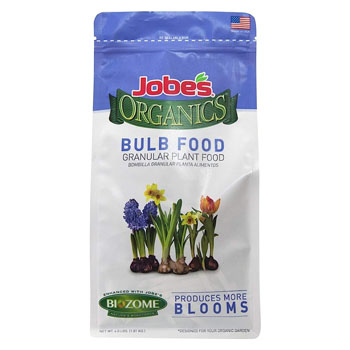 |
Check price on Amazon |
NPK: 3-5-4
Jobe’s Organics granular fertilizer is a fast-acting and organic fertilizer. It is an OMRI-listed, excellent bulb food for tulips. Hence, no synthetic chemicals go into this fertilizer.
This plant food has Jobe’s Biozone, a proprietary blend of microorganisms that break down to yield faster results. It improves soil conditions, promotes healthy plant growth, and helps in drought resistance.
Apply this four-pound easy-to-pour bag every three to five weeks for optimal results. Jobe’s organics provide the natural nutrients crucial for colorful and vibrant blooms. It is safe for use around children and pets.
When to Use It?
You can apply every three to five weeks, making it ideal for new and existing bulbs.
3. Voluntary Purchasing Group Fertilome
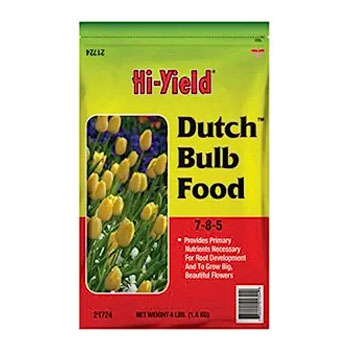 |
Check price on Amazon |
NPK: 7-8-5
It is a top-quality fertilizer for proper root development in all flowering bulbs. This package weighing four pounds is a good pick for feeding tulips and providing your blooms with vital nutrients to support healthy growth.
You can use it for new and established planting. It will help accentuate the growth and vitality of flowering bulbs.
When to Use It?
This product is exquisitely formulated for use during planting time, ensuring the bulbs get the vital nutrients necessary for optimal development. A recommended application rate is 4 cups per 50 square feet for established areas, but use 3/4 cups per 10 square feet for new plantings.
4. Lilly Miller Bulb & Bloom Food
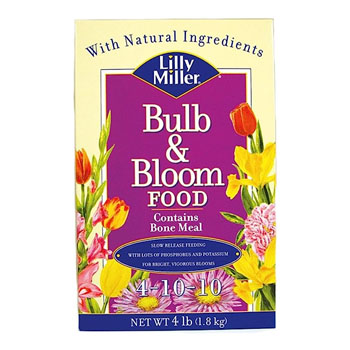 |
Check price on Amazon |
NPK: 4-10-10
It is a specialized and one of the best fertilizers for tulips that helps promote abundant bulb blooming and healthy growth.
This plant food provides a balanced blend of vital nutrients to support robust root development, vibrant blooms, and strong stems. It contains a high phosphorus and potassium content, crucial for flower production and overall plant health.
Its formula is exquisitely formulated for bloom and bulb plants, ensuring they receive the nutrients necessary for optimal performance.
When to Use It?
You can use this plant food for tulips during planting and blooming periods. Gardeners recommend applying this plant food before or during planting. It helps tulips get the necessary nutrients for healthy root development.
You can also use it to support vibrant and abundant flower production during the blooming season.
5. Miracle-Gro Shake ‘N Feed Fertilizer
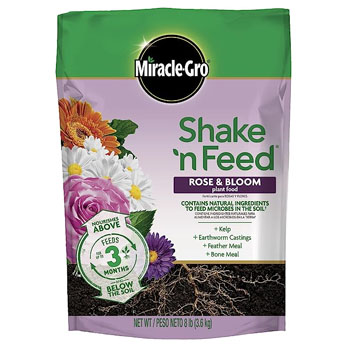 |
Check price on Amazon |
NPK – 10-18-9
Though extensively used for roses and blooms, is miracle grow good for tulips?
Yes!
It is exquisitely formulated plant food with natural ingredients that nourish the soil’s microbes. It is not one of the specialized bulb fertilizers for tulips but it is a good pick overall.
It promotes robust roots and boosts water efficiency, resulting in vibrant colors and more blooms than unfed plants.
You can use it for both new and existing flowers, and it will offer vital micronutrients for their vitality and growth. With a feeding duration of approximately three months, this plant food takes the guesswork off the feeding and ensures consistent nourishment for the plants.
You can use it for all flowering plants, whether planted in containers or on the ground. Consider reapplying every three months to achieve a beautiful garden all season.
When to Use It?
You can use this plant food across the growing season but do not apply it on wet foliage or pile it against the plant stem.
Consider lightly and evenly mixing this bulb food for tulips into the top one to three inches of the soil, and water thoroughly to initiate feeding. Reapply every three months for best results.
Related: Tulip Lifespan | How to Plant Tulip & Daffodil Bulbs Together | Fertilizers for Daffodil & Tulip Flowers
What Is A Natural Fertilizer For Tulips (Organic)?
In natural and organic fertilizers, you have multiple options that can provide the tulip varieties with necessary nutrients sans any synthetic chemical usage.
Here are some of the best options.
1. Bone Meal
Derived from animal bones, bone meal is rich in phosphorous that helps with flowering and root development. It provides the tulips with a slow release of nutrients and is absorbed by the plants to boost their overall vigor and health.
2. Blood Meal
It is a natural and organic bulb fertilizer for tulips. Blood meal has a high-nitrogen content. Sourced from dried animal blood, blood meal offers a quick release of nitrogen that promotes robust growth and lush-green foliage in tulips.
You can use it to stimulate healthy vegetative development in early growth stages.
3. Greensand
4. Compost
Composed of marine sediment, trace elements, and valuable minerals, Greensand boosts nutrient uptake, betters soil structure, and promotes healthy growth in tulips. It also helps moisture retention in the soil and supports vitality and overall health.
Compost is a natural plant food created by decomposing organic matter, such as yard waste and kitchen scraps. It enriches the soil with vital nutrients, boosts moisture retention, and helps amplify soil structure.
Compost also promotes overall plant health, encourages beautiful blooms, and stimulates root growth in tulips.
Homemade Fertilizer For Tulips
When it comes to homemade plant foods, we have some suggestions to share with you. These are easy to make and provide beneficial nutrients for the tulips.
A. Are eggshells good for tulips?
Yes, eggshells can be beneficial for tulips. They are a good calcium source, vital for cell wall development. Add crushed eggshells into the soil around tulips to provide a slow-release calcium boost. It prevents nutrient deficiencies and promotes healthy growth in tulips.
B. Is coffee good for tulips?

Coffee in its grounded form i.e. coffee grounds can be good for feeding tulips when used in moderation. It is rich in nitrogen, potassium, phosphorus, and other micronutrients, which nourish the soil and promote healthy growth.
But do not apply excessively, as it can spike acidity levels, which may not be recommended because tulips prefer neutral to slightly alkaline soil.
C. Is Epsom salt good for tulips?
Epsom salt can be good for tulips in some situations. It is basically magnesium sulfate that helps provide sulfur and magnesium, the two vital micronutrients for plant growth.
So if your soil lacks these nutrients, applying Epsom salt can help supplement them and promote healthier tulip growth.
But employ it sparingly as excessive use can result in nutrient imbalance and harm the plants.
Are Fertilizers Absolutely Necessary For Tulips?
No, fertilizers are not absolutely necessary for tulips, as they are low-maintenance plants, but they can benefit from feeding, especially over the years when the soil nutrients get depleted.
When To Fertilize Tulips?
While tulips do not mandatorily need feeding during planting, adding a balanced plant food helps support blooming and growth.
You must use plant food when the tulips have grown, either during the spring season as leaves emerge or as a top dressing in the fall. It helps replenish the nutrients in the soil and ensures optimal health and vigor for the tulips.
Do Cut Tulips Need Plant Food? If Yes, What To Feed Tulips In A Vase?
Yes, cut tulips benefit from plant food in the vase. You can use a commercial flower food pack or make a homemade solution by mixing water with a teaspoon of sugar and a few drops of bleach.
Change the water every other day and add fresh food every few days for long-lasting blooms.
How To Choose The Best Plant Food For Tulips?
When picking the tulip fertilizer, consider the following factors:
1. Soil assessment: Perform a soil test to determine the nutrient deficiencies in the soil to feed accordingly.
2. Organic vs. Synthetic: Synthetic fertilizers give quick results but harm the soil in the long run. Weigh the pros and cons of both alternatives to check which is a better pick for your plants.
3. Liquid/Granular/Spikes: Consider the application method and convenience that suits your garden setup and preferences.
4. NPK ratio: Look for a balanced NPK ratio, such as 10-10-10 or 10-15-10, to provide essential nutrients for overall growth and blooming.
5. Ease of use and cost: Evaluate the ease of application and the cost-effectiveness of the fertilizer option for your specific needs and budget.
